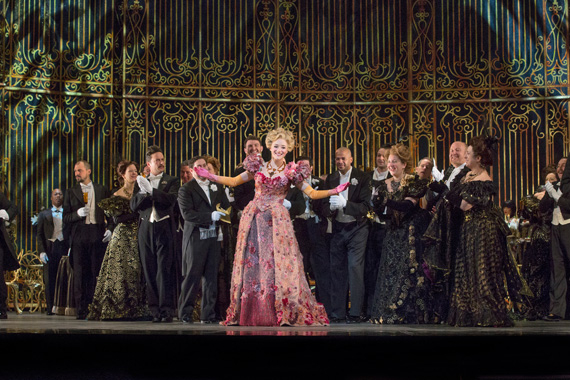Die Fledermaus
The Met’s glittering new production of the Strauss operetta has its audience ringing in the New Year with each performance.

(© Ken Howard/Metropolitan Opera)
Philandering spouses, lavish parties, and bored Russian billionaires: A lot of the fixtures of life in fin de siècle Vienna will feel awfully familiar to today’s New Yorkers. That seems to be the primary conceit of The Metropolitan Opera‘s new production of Die Fledermaus, “Waltz King” Johann Strauss Jr.’s champagne-soaked operetta about practical jokes and marital infidelity. With new English dialogue by Douglas Carter Beane and updated English lyrics by director Jeremy Sams, this most Austrian of operas is still as much fun (and as funny) as it must have been when it premiered in 1874.
To be sure, Beane and Sams have shifted the time period a bit, setting Die Fledermaus on New Year’s Eve, 1899. Gabriel von Eisenstein (Christopher Maltman) is going to jail for slapping a police officer. His wife, Rosalinde (Susanna Phillips), is so distraught, she refuses to let her maid, Adele (Jane Archibald), leave for the night to visit her dying aunt. Of course, that is just Adele’s excuse. She actually wants to attend the wild New Year’s Eve Party being thrown by Russian billionaire Prince Orlofsky (Anthony Roth Costanzo). Meanwhile, lovesick tenor Alfred (Michael Fabiano) attempts to woo Rosalind by serenading her through a window.
Eisenstein returns home from court, prepared to report to jail. Before he begins his sentence, however, his best frenemy Dr. Falke (Paulo Szot, doing his best Snidely Whiplash impersonation) convinces him to sneak away to Prince Orlofsky’s party disguised as a Frenchman. Rosalinde becomes suspicious when she sees her husband leave for jail in white tie and tails and decides to trail him to the party, disguised as a Hungarian countess. Uncomfortably enough for everyone, the jail’s chief warden, Frank (Patrick Carfizzi), is also in attendance and disguised as a Frenchman. Will any of the guests notice that neither of these Austrians actually speaks French, or will they be too drunk to care?
True to form, this comedy of mistaken identity and drunken high jinks is as effervescent as a glass of champagne. As is the fashion of today, it is also incredibly metatheatrical and self-aware, with lots of wink-wink, nudge-nudge lines about tenors and Austria. “How could anything bad ever come from Austria?” asks Ida (Betsy Wolfe, providing convincing gusto to the self-involved Viennese actress) as she toasts to the coming 20th century, which all the party guests predict will be a golden age of peace and prosperity in Europe. In turn, Orlofsky toasts to a great century for the Russian Royal Family (ha!) before everyone waltzes the night away and sings a song demanding “more champagne!”
Costanzo steals the show as the effete Russian oligarch. Wearing a gilded, Klimt-inspired robe and a Johnny Weir coiffure, this Orlofsky looks like he just sashayed off the pages of Depesha magazine. This countertenor wows us with his high-flying falsetto, all while maintaining an undeniably Russian ennui in midst of the part of the century.
Beane and Sams have peopled their Viennese masquerade with a host of stereotypically Austrian characters, including a sizable chunk of the dramatis personae from The Sound of Music. In fact, the beloved Rodgers & Hammerstein musical is something of a running joke: In the third act, jailer Frosch (Danny Burstein in the show’s other scene-stealing performance) points to a door through which he expects Frank to enter and announces, “The Family von Trapp,” as spotlights desperately search for the tardy warden.
Although this Borscht Belt humor is occasionally groan-inducing, it’s all in good fun and doesn’t feel out of step with Strauss’ original work, which has always been about goofy humor. Indeed, the entire story is premised on an elaborate practical joke by Dr. Falke. Even the metatheatrical bits seem native to the piece: Strauss wrote the role of Alfred to poke fun at the overly dramatic tenor roles of Italian opera.
Soaring over everything is the music, which is bright and richly accented under the baton of Adam Fischer. Starting from the very first lightning strike of a note in the overture through the boisterous finale, none of the magic is lost in Strauss’ classic score.
The last Met production of Die Fledermaus (Otto Schenk, 1986) featured, at the top of the second act, a giant rotating chandelier that descended into the proscenium. Not to be outdone in opulence, designer Robert Jones has created a world of glittering light and color, in which every mise-en-scène could be a painting. A blood-red parlor becomes a marble ballroom, complete with a rotating stage and (yes) a moving chandelier laden with showgirls.
Clocking in at just under four hours, Die Fledermaus is undoubtedly an investment in terms of time, but it’s time well spent, especially if you’re the type who likes to ring in the new year (or perhaps just a new production) with champagne. I got the distinct feeling during intermission that the bubbly was selling particularly well.









